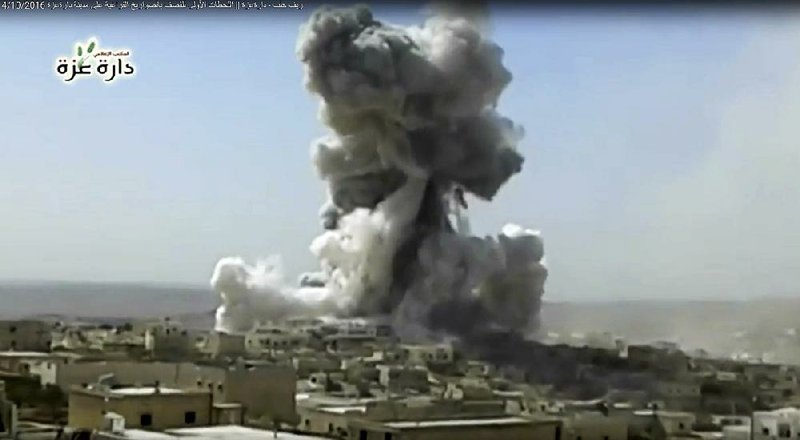BRUSSELS -- U.S. Secretary of State John Kerry criticized Russia on Tuesday for ignoring the Syrian government's use of chlorine gas and barrel bombs against its own citizens, and he left little hope for an early resumption of talks with Russia about a cease-fire.
Speaking in the Belgian capital before the opening of a conference on Afghanistan organized by the European Union, Kerry said the United States would continue efforts to end the fighting in Syria through the United Nations, but that Washington had little hope of persuading Russia to give up its support of the government of Syrian President Bashar Assad.
President Barack Obama's administration announced Monday that it was suspending bilateral talks with Russia on a cease-fire.
"We acknowledge in sorrow -- and, I have to tell you, outrage -- that Russia has turned a blind eye to Assad's deplorable use of chlorine gas and barrel bombs against his people," Kerry said. "Together, the Syrian regime and Russia have rejected diplomacy, and seem to have chosen instead to continue their pursuit of a military victory over the broken bodies, bombed-out hospitals and traumatized children of a long-suffering land."
Kerry's speech, at an event hosted by the German Marshall Fund of the United States, focused mainly on trans-Atlantic cooperation between the U.S. and the EU. Noting concerns about the United Kingdom's vote to leave the European Union, Kerry said the United States would remain a strong ally of the U.K. and the EU.
"As much as some of us may wish the U.K. vote had gone the other way, the lesson we must take from this democratic choice is not that we need less Europe or less U.K.," Kerry said. "Rather, we all need more of both."
He added: "The United States will support its friends and allies on both sides of the channel as you work through the tough issues ahead. But we will not be shy about where our interests lie: We need the strongest possible EU, the strongest possible U.K., and a highly integrated, collaborative relationship between them."
Since a cease-fire for Syria brokered by the U.S. and Russia ended Sept. 19, rebel-held neighborhoods where 275,000 people live have been subjected to some of the worst bombardment, by Russian and Syrian warplanes, since fighting began in 2011. Hospitals have been among the hardest-hit targets.
At least 420 people have been killed and more than 1,000 wounded in and around Aleppo since the cease-fire collapsed, according to the Britain-based Syrian Observatory for Human Rights. Most of the deaths were in eastern Aleppo, where scores of buildings were demolished by Russian and Syrian airstrikes.
On Tuesday, forces backing Assad pressed their offensive on Aleppo's rebel-held zone from the south, after capturing areas on other fronts in recent days. As reinforcements arrived, including Shiite fighters from Iraq, the strategy appeared to be to retake rebel-held areas bit by bit, backed by Russian air power, rather than risk a potentially costly all-out ground battle.
"The regime is bombing civilians because of its inability to storm Aleppo for years," said opposition activist Abu Firas al-Halaby, adding that talk of the imminent arrival of reinforcements was part of a "psychological war" against the rebels.
The Syrian government is backed in the Aleppo battle by Lebanon's Hezbollah, the Palestinian Quds Brigade and Iraq's Shiite al-Nujaba militia, among others.
An official with the al-Nujaba militia said the group had sent some 4,000 fighters in recent weeks in preparation for a battle to storm Aleppo's eastern neighborhoods. The official, who spoke on condition of anonymity because he was not authorized to discuss military strategy, refused to say when such an attack might take place.
Capt. Abdel-Salam Abdel-Razek of the Nour el-Din el-Zinki rebel group said a wide ground offensive was unlikely because the government can't match the rebels' advanced street fighting.
"I don't expect that. I expect attrition and attempts on more than one front. But I don't see that it has the capacity to carry out a wide offensive on all fronts," Abdel-Razek said. "As a force on the ground, it is mobilizing and it can possibly later, but not now."
Government forces have made some progress on the ground recently, including last week's capture of the Handarat Palestinian refugee camp north of Aleppo and the nearby Kindi Hospital, which overlooks a key intersection of vital roads. Syrian troops also captured the central neighborhood of Farafra after pushing forward from the Old City.
On Tuesday, government forces and their allies attacked the southern rebel-held neighborhood of Sheik Saeed, opening a third front against the rebels.
An Aleppo-based activist, Baraa al-Halaby, said residents now avoid underground shelters, for fear of bunker-busting bombs that penetrate several floors before exploding. Still, he said, government forces will not be able to storm rebel-held neighborhoods of the city.
"Tanks will not be able to advance easily in the streets," said Baraa al-Halaby, adding that the Handarat camp was taken only because it is an open area.
Demonstrating Moscow's commitment to backing Assad, the Russian military said it has beefed up its forces in Syria with state-of-the-art air defense missiles.
The Defense Ministry said Tuesday that a battery of the S-300 air defense missile systems has been deployed to Syria to protect a Russian naval facility in the port of Tartus and Russian navy ships in the area.
Information for this article was contributed by Rod Nordland of The New York Times and by Bassem Mroue, Qassim Abdul-Zahra, Sarah El Deeb and Philip Issa of The Associated Press.
A Section on 10/05/2016


